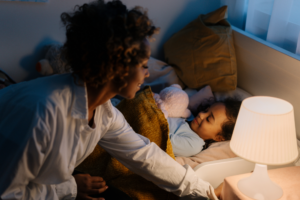My Child With ADHD Can’t Sleep

Does your child with ADHD – and other types of neurodivergence -- struggle with sleep? Here are expert sleep tips -- for them and for you.
Discover proven strategies to understand why, help them fall asleep faster, stay asleep longer, and lessen power struggles and frustration.
"What Should I Do?"
"My child with ADHD can't sleep. What should I do? What do I need to know?" We hear some variation of these questions from parents all the time.
We know it's not just our children who are having trouble sleeping. Often, sleep is evasive for adults, too – because of ADHD, anxiety, and other issues connected to differently wired brains. And, we gotta admit: Sometimes we just don't do a great job of putting ourselves to bed!
To begin to address the huge issue of sleep, especially when it's paired with ADHD, anxiety, autism, OCD, and other neurospicy challenges, we asked some sleep doctors who really get neurodivergence and sleep challenges. They know their sleep stuff when it comes to helping families struggling with the challenges of cutting Zzzzs.
The ADHD Sleep Doctor is In: Dr. Funke Afolabi-Brown
Dr. Afolabi-Brown is a triple board certified sleep physician, founder of Restful Sleep MD, and author of Beyond Tired —A Sleep Physician’s Guide to Solving Your Child's Sleep Problems for Good. She recognizes that sleep is one of those things that parents want to get right -- for their kids and for themselves.
"After all," says the good doctor, an expert in pediatric sleep disorders, "sleep is more than just rest – it’s essential for emotional regulation, availability for learning, and overall health and well-being." But in real life with complex kids, getting quality sleep can feel like an impossible task, as can other sleepy-time challenges, like bedtime routines, restless nights, or exhausted mornings.
Dr. Afolabi-Brown explains that sleep nuances are pronounced in the world of neurodivergent children. For example, ADHD, anxiety, autism, and related conditions impact sleep cycles and can contribute to sleep disorders, so traditional sleep advice and strategies for more shut-eye may not work. Sleep transitions -- meaning going into and coming out of sleep -- are typically more challenging for neurospicy kids whose natural sleep rhythm may differ from their neurotypical peers'.
Paying attention to the nuances can provide guidelines for creating effective solutions, so she encourages parents to keep a record of sleep patterns. Talk to your child’s pediatrician about what you’re noticing to determine if further investigation is warranted.
Dr. Afolabi-Brown discusses this in much greater detail in her masterclass, "Sleep Rx: A Sleep Doctor’s Prescription for Neurospicy Families," a recording now available for purchase at that link. Dr. Afolabi-Brown explains what parents of complex kids need to know about sleep and how to get more of it (for your kids and for you).
This learning opportunity -- 60 minutes with the doctor followed by a 30-minute Q&A with Diane and me -- provides actionable tools to improve your family’s sleep with fewer power struggles and less frustration. You'll also discover how to transform sleep struggles into restful nights … for the whole family.
You Need Sleep, Too (and maybe a pair of bed socks): Dr. David Pomeroy
A family medicine physician since 1979, Dr. Pomeroy explains a bit about sleep routines to help everyone – adults included – get their needed minimum hours of sleep (ideally: eight).
You might be thinking, Wait, what? We adults need eight hours of sleep, too!
Says Dr. Pomerory, "People think, 'Well, I can get by on seven.' Yes, you can get by, but you really aren’t functioning as well as you can. For teenagers, it really has to be at least eight, preferably a bit more, which is difficult with their schedules. For anyone under 12, certainly nine hours is better."
Does that feel impossible?
Here's what Dr. Pomeroy suggests for our kids with ADHD, autism, anxiety, OCD, and other challenges, as well as for ourselves:
- Start -- and stick to -- a sleep routine. Begin it one hour before you ideally want to be asleep.
- Get off electronics. If you want to read, read a book. (If you’re limited to your handheld device, then use one with a blue-light filter).
- Wear bed socks. It’s true: people with ADHD have colder hands and feet than neurotypicals. A research group in the Netherlands studies ADHD and sleep, and their advice to neurodivergent folks: don bed socks.
Sleep does not need to be elusive for your child with ADHD -- or for you! And seriously, you are not alone in your sleep struggles, though it sure can feel like it at 3 a.m.! Start with some steps toward bidding night-night to sleep struggles for your child with ADHD -- and maybe other neuro spiciness -- and for you.
Listen to the full interview with Dr. Pomeroy -- complete with other great strategies you can try on besides bed socks -- in this 20-minute pearl of an interview.

